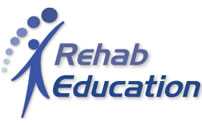Printer Friendly Copy
Shoulder Dysfunction: A Practical Approach to Examination and Treatment
Rehab Education

Format(s): Live Seminars
Discipline(s): Physical Therapy / Occupational Therapy
Contact Hours: 12
Registration Fee: $529
Objectives
By the end of this course, participants will:
Implement screening techniques to significantly increase examination efficiency
Incorporate deficit-specific interventions to target motion dysfunction identified during examination
Develop robust multi-faceted treatment programs for shoulder dysfunction that are motion-based
Apply and document findings for neural mobility testing of the UE using the neural mobility grading scale (0-5/5) for biasing the brachial plexus
Identify neural-based motion restriction via mobility testing and palpation
Integrate NPSTM, IASTM, and taping treatments to enhance outcomes and carry-over
Target Audience
Occupational Therapists
Occupational Therapy Assistants
Physical Therapists
Physical Therapy Assistants
Certified Athletic Trainers
Agenda
This course consists of an online component and a live component. The online component is a 2-hour independent study pre-course consisting of recorded presentation of key concepts; this must be completed prior to attending the live component. The live component consists of 10 hours of live classroom presentation and lab sessions.
INDEPENDENT-STUDY PRE-COURSE: These recordings must be viewed prior to attending the live, in-person portion of the course. (Values are in hourly increments)
2.0 hours
Introduction
Shoulder anatomy and biomechanics
Concavity compression
Total Arc of motion
Scapular kinematics
Movement dysfunction (possible sources of motion loss)
Joint components
Motor deficits
Neural mobility deficits
Screening Techniques
Rotator Cuff Competency
Total Arc of Motion
Scapular motion
Neural Mobility
LIVE IN-PERSON, HANDS-ON COURSE: (All recordings must be viewed prior to start of this portion of the course)
0.5 Recap of pre-course
SCREENING TECHNIQUES LAB
0.33 Active movement Screen
0.33 Rotator Cuff Competency Screen
0.33 Total Arc of Motion Screen
0.25 Scapula Screen
0.75 Neural Mobility Screen
INTERVENTIONS
Advanced Manual Interventions
1.75 Taping
Rotator Cuff stabilization kinesiology tape
Scapular stabilization non-elastic taping
Brachial plexus median nerve bias
Lift at pectoralis minor
Lift at pronator teres
Brachial plexus radial nerve bias
Lift at Arcade of Frohse
1.0 NPSTM
Shoulder
Infraspinatus
Lower Trapezius
Rhomboids
Serratus anterior
Brachial plexus
Cords
Trunks
Deltopectoral & coracopectoral interval
1.5 IASTM
Shoulder
Superficial
Deep
Brachial plexus
Scalenes
Subclavius
Pectoralis minor
Deltopectoral & coracopectoral interval
Neural Mobility
Pin/Stretch along course
Scalenes
Pectoralis minor
Deltopectoral & coracopectoral interval
Exercise-based (mostly) Interventions
Concavity Compression
IR/ER Sinusoidal
ER Side hop
Scapular Stability
TB T’s and diagonals + integration of cervical stabilization
Kettle Bell arm bar protractions, crosses, circles
Farmer’s Carry
Bell up carries, 3 position
Blackburn’s
Modified Blackburn’s on Stability ball
Y T I & Press
0.5 Scapular Dyskinesia
Scapular Clocks
Brügger’s
Mirror SICK Scapula open and closed chain exercises
3 m.o. press ups
0.5 Restoring Total Arc Rotation Motion (TARM)
Pin/Stretch
Mobilization With Movement Internal Rotation
Sleeper Stretch and Genie Stretches
Self-release with LAX ball
0.5 Thoracic Mobility
Foam rolling
ACJ / SCJ Mobs
Mid-back extension mobs
Upper thoracic extension mobs
Bonus videos of the exercises above will be provided to attendees for post course study
CEU’s: 10 direct contact hours+ 2 independent study contact hours= 12 total
*Includes self-study component
Appropriate lunch and study breaks will be in addition to total hours.
Description
Working with clients that have shoulder dysfunction can be challenging. This course provides a practical evidence-informed pathway that uses special testing for the purpose of guiding treatment decisions. Included are the concepts of assessing and treating motion deficits based on scapular and glenohumeral motor control, soft tissue restrictions, neural mobility restrictions, and thoracic spine stiffness.
This hybrid course includes independent study components (recorded lectures and demonstrations) which are completed prior to the on-site training, allowing the in-person sessions to be heavily lab-based.
Covered motion-based interventions consist of:
taping
neural mobilization
instrument assisted soft tissue mobilization (IASTM)
negative pressure soft tissue mobilization (NPSTM) or cupping
corrective exercises
Please dress to allow access to your entire upper quarter to enhance the learning process.
Dates and Locations
| |
Register
Address:
Somerset New Jersey
Location:
5/3: 6:30p-8:30p 5/4: 8a-5:30p
Dates:
05-03-2024 - 05-04-2024, 8:00PM 5:30PM Eastern
Instructor(s):
Accommodation(s):
|
Register
Address:
San Diego California
Location:
Dates:
05-18-2024 - 05-19-2024, 8:00AM 5:30PM Eastern
Instructor(s):
Accommodation(s):
|